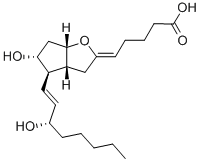Definition
ChEBI: Prostaglandin I2 is a prostaglandins I. It has a role as a mouse metabolite. It is a conjugate acid of a prostaglandin I2(1-).
General Description
Marketed as the sodium salt(epoprostenol; Flolan by GlaxoSmithKline), this productis administered by continuous infusion of a recently preparedsolution (within 48 hours) for the treatment of primarypulmonary hypertension (PPH). The chemical stability ofthis compound in aqueous solution is limited, and the biologicalhalf-life is less than 6 minutes. The potent vasodilatory,platelet antiaggregatory effect, and vascularsmooth muscle antiproliferatory effect of this naturallyoccurring eicosanoid produce a dramatic but short-livedtherapeutic effect in PPH patients. Because continuousuninterrupted administration of the drug by portable infusionpump is necessary to prevent symptoms of reboundpulmonary hypertension, distribution of this product isrestricted.
Mechanism of action
Prostacyclin is derived from the endothelium of VSM, and its synthesis is reduced in
patients with PAH. Its physiological antagonist, thromboxane A2, is increased, however, causing vasoconstriction.
Prostacyclin produces its vasodilation via activation of the PIP2 signal transduction pathway, increasing concentrations of cAMP。
Epoprostenol is the sodium salt of prostacyclin and is administered as an implanted, continuous IV infusion because of
its very short duration of action (2–3 minutes). It must be reconstituted with a special glycine buffer diluent, giving a
reconstituted solution with pH 10 to 11 that is stable for 15 minutes at 4°C and for less than 10 minutes at 37°C. Its
injection solution is unstable at a lower pH because of acid-catalyzed hydrolysis of the vinylether structure to
6-oxo-PGF1α. It is short acting because of rapid metabolism at the 15-hydroxy group to the inactive 15-oxo
metabolite.
Clinical Use
Prostacyclin and its analogs (prostanoids) are potent vasodilators and possess antithrombotic and
antiproliferative properties.

